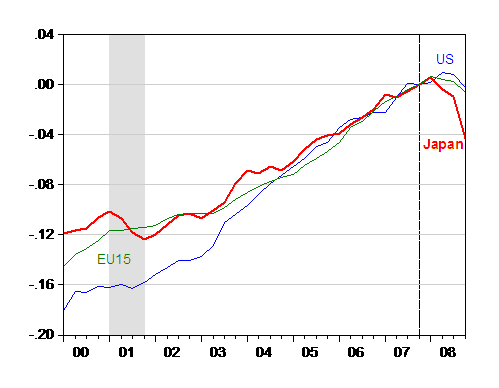Score One For "Unfettered" Capitalism
I think most readers of this site will understand the meme that somehow the recent Wall Street meltdown represented "unfettered capitalism under George Bush" is absurd. The US financial industry is the most highly regulated sector of the economy, and George Bush was in no way a free market capitalist. Bill Clinton, for example, had a better laissez faire record than Bush, in my scoring.
But those pushing for a Euro-Japanese style corporate state (e.g. Barack Obama) might beware. It probably comes as no surprise the US economy has outperformed the EU and Japan over the last decade, but would you believe we have also out-performed them over the last year? The chart below is from Paul Kedrosky, and shows GDP indexed to 4Q07 (the graph is not the way I would have drawn it -- the third small hash mark is actually the fourth, not the third, quarter).
This is why our recessions tend to be shorter than those in Japan and Europe. These other economies are generally more of a corporate state, with a major goal of the government to maintain the incumbents in the corporate world. I would argue that the key determinants to recovering from a recession quickly are asset, capital, and labor mobility. Japan has many structural limitations on these, and it dragged their recession out for years.
bbartlog:
Japan is also getting screwed now by the long-term blowback from their fifteenplus years of low interest rates.
February 16, 2009, 9:55 amThe yen carry trade, which was run profitably for many years, involved borrowing money from Japan's central bank (at zero or tiny interest), using those yen to buy dollars, and then investing the dollars in something that would give a return - money market funds or tbills.
This made the yen cheap relative to the dollar, and helped Japan's huge export sector (even if it didn't really create a healthy economy for them).
Over the past six months, the yen carry trade has been unwinding and the yen has risen 20% against the dollar. This masks the full extent of the yen's rise, since dollar has also been gaining against other currencies; the yen has risen 32% against the Euro since last July, for example.
So at a time when we'd expect their exports to shrink anyway as part of a global slowdown, they're suddenly facing a 30% currency headwind as well. No wonder their GDP is cliffdiving. And there's no reason to think the yen is done rising yet, either.